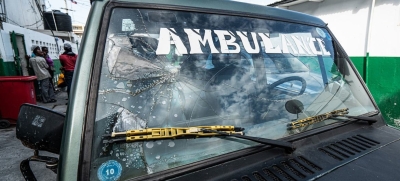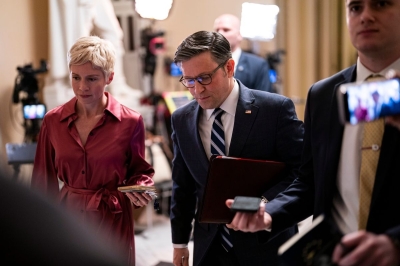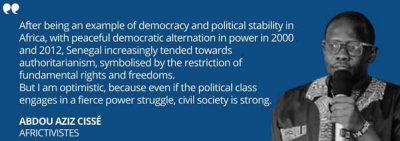Should Twitter be held responsible for the Islamic State’s terrorist acts because ISIS used Twitter’s website? That’s the central question underlying a case the Supreme Court heard on Wednesday, which concerns the 2016 Justice Against Sponsors of Terrorism Act (JASTA).
But unfortunately, JASTA reads like it was written by someone who takes a perverse pleasure in watching lawyers and judges try to navigate a maze of vague rules, incomprehensible legal standards, and multi-factor tests layered on top of other multi-factor tests.
Briefly, the law permits “any national of the United States” who is injured by an act of international terrorism to sue anyone who “aids and abets, by knowingly providing substantial assistance” to anyone who commits such an act. It also instructs courts to look at a federal appeals court’s 1983 decision in Halberstam v. Welch to determine what it means to “aid and abet” or to provide “substantial assistance” to a terrorist act.
To be fair, JASTA’s drafters didn’t write the guidelines laid out in Halberstam. But they did endorse them. And Halberstam is simply a mess. Under Halberstam, to determine if someone “knowingly and substantially” assisted an illegal act, courts must consider an array of six different factors. Many of these factors, in turn, are vague.
Halberstam, for example, says that courts must “look first at the nature of the act assisted,” without providing any real guidance on what that means. They should consider the “amount of assistance” a defendant provided — although Halberstam does not inform us how much assistance is enough to trigger liability. And courts should consider other, equally ill-defined factors, such as the defendant’s “relation” to the person who committed an illegal act, and the defendant’s “state of mind.”
With little more than these vague statements to rely upon, the nine justices spent much of Wednesday’s argument in Twitter v. Taamneh — a lawsuit asking whether social media companies violated JASTA because the terrorist group ISIS sometimes uses websites like Twitter, Facebook, and YouTube — begging the lawyers arguing the case to give them some kind of coherent framework to latch onto.
Is there any way to “cut through that kudzu,” Justice Neil Gorsuch asked one of these lawyers at one point, referring to the morass created by JASTA and Halberstam. He then paused for only a fraction of a second before saying, in a pleading tone, “please say yes.”
The justices appeared so flabbergasted by JASTA that it is difficult to predict how this Twitter case will ultimately be decided — although only Justice Elena Kagan, who brought up lower court decisions holding that some banks can be held liable if they provide banking services to terrorists, seemed to have much appetite for reading JASTA broadly.
Several of the justices, most notably Justice Amy Coney Barrett, spent the argument proposing various ways to read JASTA’s broad-seeming language narrowly to prevent businesses from being sued for engaging in fairly ordinary business activity.
It is fairly likely, in other words, that the Court will hold that social media companies are not liable for terrorist attacks merely because terrorist organizations sometimes use their websites. But it is anyone’s guess how the justices will write an opinion that reaches this conclusion.
Justices were concerned that companies could be held legally responsible for terrorism by providing services to a public that includes terrorists
The plaintiffs’ legal theory in Twitter is rather breathtaking. They claim that the terrorist group ISIS used Twitter and similar websites to promote its views and to recruit followers. Under this theory, these websites provided “substantial assistance” to ISIS, and are legally responsible for the death of a Jordanian man with American relatives, who was killed in a 2017 ISIS attack in Istanbul.
As a general rule, companies are not legally responsible for every evil act that was committed using one of their products. If a terrorist buys a Ford truck, loads it with explosives, and then detonates this truck-turned-bomb near a federal building, the victims of such an attack typically cannot sue Ford.
In fairness, JASTA does place one important limit on plaintiffs’ ability to target any company that might have some attenuated connection to a terrorist act. A defendant sued under JASTA must “knowingly” provide substantial assistance to someone who commits an act of terrorism. So, in the Ford truck hypothetical, Ford could likely defend itself against a lawsuit by saying it did not know that its truck would be used in such a destructive way.
But it’s unclear how this knowledge requirement should apply in the Twitter case. Should the plaintiffs have to prove that Twitter knowingly provided assistance to the actual attack that occurred in Istanbul? Or is it enough to show, as those plaintiffs argue, that Twitter knew that it assisted ISIS’s broader “terrorist enterprise” by allowing ISIS to use their services?
Several justices, moreover, expressed concerns that this knowledge requirement may not provide an adequate shield to companies whose products are used by terrorists, or who otherwise do business with suspected terrorists or criminals.
Justice Brett Kavanaugh, for example, asked whether CNN could be held liable for aiding and abetting the 9/11 attack, because it previously broadcast an interview with Osama bin Laden where bin Laden declared war on the United States. Justices Kagan, Barrett, and Ketanji Brown Jackson engaged in a long colloquy with Eric Schnapper, the plaintiffs’ lawyer, about whether cell phone companies would be liable under JASTA if they sold a phone to bin Laden.
In one particularly surprising moment, Justice Samuel Alito — a former prosecutor who is often sympathetic to aggressive tactics by police — suggested that a too-broad reading of Halberstam could lead to serious civil liberties violations. Suppose, for example, that a city’s chief of police believes that a particular individual leads a criminal enterprise, but the police lack sufficient evidence to arrest this individual. If the police chief calls up local businesses and tells them not to conduct business with this suspected criminal, would those businesses have to comply out of fear that they could later be sued for aiding and abetting a crime?
As Alito’s hypothetical suggests, one problem that arises out of JASTA is that businesses will often be aware that some of their products are being used illegally, but may not have any reasonable way to stop this illegal activity. There are multiple media, academic, and think tank reports, for example, pointing out that many Twitter accounts are used by individuals associated with ISIS. Is that enough to hold Twitter liable for every terrorist attack committed by ISIS?
The short answer is that JASTA’s vague language can plausibly be read to say that they can — though there are equally plausible ways to read the statute more narrowly.
If the Court accepts a broad reading, that could make it extraordinarily difficult for these businesses to operate. And, in the case of tech companies like Twitter or a cell phone company, might also push them to engage in the kind of mass surveillance of their customers that would sweep up millions of innocent consumers.
There are probably five votes to read JASTA narrowly, but the justices appeared unsure how to do so
Several of the justices appeared to recoil at the possibility of such broad liability, but they seemed unsure how to read JASTA to prevent it. Instead, many of the justices appeared to take turns tossing out possible ways to read JASTA in order to protect companies like Twitter from excessive liability.
Barrett, for example, suggested two possible rules. One is that the Court could rule it is not enough to show that Twitter provided some vague assistance to ISIS. Instead, they would need to claim that Twitter actually assisted the particular terrorist attack that killed a particular plaintiff — in this case, the 2017 attack in Istanbul.
This rule might flow from JASTA’s language stating that individuals who substantially assist “an act of international terrorism” are liable for that act.
Alternatively, Barrett suggested that “if the defendant is a business that is open to all comers,” then a plaintiff has to show more than just that the defendant had vague knowledge that some of its products were being used by terrorists. Instead, there would have to be “some allegation of specific knowledge” about a specific attack.
Gorsuch, meanwhile, offered a third suggestion. Because JASTA states someone may be held liable for aiding and abetting “the person who committed” an act of international terrorism, Gorsuch suggested a plaintiff must show that the defendant aided the specific individual who committed a specific attack. Under this theory, the Twitter plaintiffs would have to show that social media companies aided the individual who perpetrated the attack in Istanbul.
Early in the argument, Justice Clarence Thomas suggested a similar approach, hinting that a plaintiff might have to show that a defendant had knowledge of a particular attack, and not just knowledge that their products were sometimes used by terrorists.
And there’s also a fifth possible way to dispose of this case. On Tuesday, the Court heard arguments in a closely related case asking whether a federal law, Section 230 of the Communications Decency Act of 1996, immunizes social media companies from this kind of JASTA lawsuit. If the Court determines these companies are immune under Section 230, that would obviate the need to figure out how JASTA applies to social media — at least for now.
Ultimately, the Twitter case is messy because Congress wrote a messy law. JASTA does not adequately define key terms like “substantial assistance,” and the most guidance it does offer is a citation to a vague court decision handed down 40 years ago. That’s not how Congress should behave when it writes important national security laws that make non-terrorists legally responsible for terrorism.
But the Supreme Court has to wrestle with the laws that Congress actually wrote, not the laws we might wish that Congress had drafted. And that means that no one on the Court appeared to have a good sense of what to do about JASTA.






